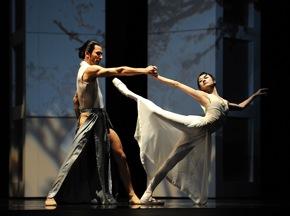Eshima: a Musician's Music at S.F. Ballet
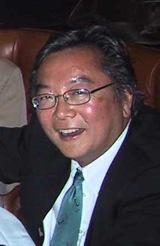
Only half-jokingly did I say to some of the orchestra musicians in the lobby of the War Memorial Opera House Thursday night that "There will be dancing, too." The distinguished audience — including many members of the S.F. Symphony, the S.F. Opera Orchestra, and the “Freeway Philharmonic” — was there partly to hear the music.
The music in the offing was the commissioned score from Shinji Eshima for the San Francisco Ballet's world premiere of Yuri Possokhov's RAkU.
The ballet and the music were received with a huge, well-deserved ovation from the audience nearly filling the 3,146-seat theater (not counting standing room), but the candid truth is there would have been enthusiasm even if the performance had been just good enough.
The musicians were there to cheer on one of their own. For three decades, Eshima has been bassist for the Ballet and Opera orchestras. He also is on the faculty of both S.F. State University and S.F. Conservatory of Music, having taught at S.F. School of the Arts, Stanford University, and UC-Santa Cruz. And yes, in his spare time, he composes.
In the case of RAkU, Eshima composes magnificently. It is an exceptional score: rich, passionate, stormy, and lyrical by turns, instantly accessible and yet demanding to be heard again, even without the ballet — though it served the piece perfectly. Under Music Director Martin West's baton, the Ballet Orchestra did justice to the work.
As Cheryl A. Ossola quotes the composer in the program notes, he said about the complex piece (which even includes Morse code for "I love her"):
The central theme of the score is burning. The burning of desire, of passion, of loyalty; the burn of suffering, of jealousy; finally the burning in death — emotions that are so strong that they overcome the discipline of a Zen monk and overcome the loyalties of samurai.The choreographer for this first ballet score by Eshima is San Francisco Ballet Resident Choreographer Yuri Possokhov, who is fast becoming a major figure in the world of dance.That burn throughout one's life is what I think is the greatest thing about being human, the beauty of it all. The grief isn't beautiful, in and of itself, and the loss isn't. But the empathy for it is, and that's what I was trying to convey.
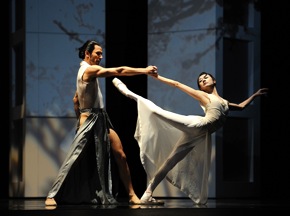
Photo by Erik Tomasson
With the vastly entertaining Magrittomania, Damned, and 10 other works behind him, Possokhov has now created a major piece that will be performed by many ballet companies in the years ahead.
RAkU is a gripping, virtuoso piece, reminiscent of the late Michael Smuin's dramatic — occasionally over-the-top — dance theater.
Set against Alexander V. Nichols' design intimating Kyoto's Golden Pavilion, the piece opens with an extended, spirited war dance by four men, channeling Spartacus from Possokhov's original Bolshoi home company. There is also a sense of Noh and Butoh, but in the end, it's all Possokhov.
The frenzied scene yields to the utter stillness of the royal couple standing side by side. Few dancers can be immobile and yet convey a range of emotions. Yuan Yuan Tan can and does: strength, submission, love, and fear emanate from her without her moving a muscle.
Then, in a sudden coup de théâtre, her enormous, elaborate kimono (in Mark Zappone's costume design) disappears into the flies, and she stands in the simplest of leotards. The physical transformation from splendor to vulnerability is then expressed in a gorgeous love pas de deux, danced by Tan and Damian Smith, both giving their personal best.
The prince is called into war, the princess is pursued and violated by a monk (the sensational Pascal Molat), and, after the death of the prince in an unseen battle, then by the warriors who return his ashes and sword.
At the end, Possokhov shows admirable restraint and good judgment by not giving in to the temptation of an obvious M. Butterfly finale. Left prostrate on the ground, covered with ashes and holding the sword, Tan seems to dissolve in hurt and sorrow ... and the curtain falls.
Elsie of Yeomen and the Nonsemble 6
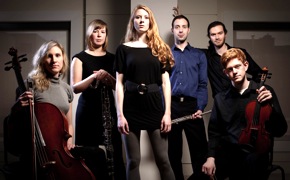
No sooner did I sing the praise of Amy M. Foote in the Lamplighters' Yeomen of the Guard than "clarinet/bass clarinet and press contact" person Annie Phillips challenged me: "How would you like to hear Amy sing Ravel's Songs of Madagascar"?
I would, indeed, and wouldn't you? Especially if you knew that also on the program will be the Debussy Violin Sonata and Messiaen's Quartet for the End of Time. The presenter is Nonsemble 6, a group of musicians recently graduated from the San Francisco Conservatory of Music.
The concerts will be given in San Francisco on Feb. 24 in the Red Poppy Art House in the Mission district, and on Feb. 26 in the Episcopal Church of St. John the Evangelist.
On Feb. 25, the same concert will be heard in St. Paul's Episcopal Church in San Rafael, and on Feb. 27 in Aptos' Christ Lutheran Church.
Nonesemble 6 presents multidiscipline concerts featuring artwork to complement the repertoire; this time, commissioned art by Olivia Lam will accompany the Messiaen. Besides Foote and Phillips, Nonsemble 6 includes cellist Annie Suda, pianist Ian Scarfe, violinist-violist Kevin Rogers, and flautist Justin Lee.
Cao Replaces Flicka With Philharmonia Baroque
Mezzo-soprano Zheng Cao will perform with Music Director Nicholas McGegan and the Philharmonia Baroque Orchestra in five Bay Area performances March 4-9 and at the Chamber Music Concert on March 13 in the S.F. Conservatory.
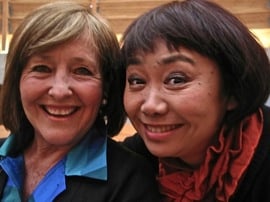
Cao replaces Frederica von Stade, who has withdrawn "for personal reasons." Since we respect her privacy, that statement will have to stand, except to say that her health appears good.
The concerts, March 4 through 9, feature the U.S. premiere of Into the Bright Lights, a cycle of songs composed by Philharmonia Baroque Chorale alumnus Nathaniel Stookey, with lyrics by von Stade herself, about singing and aging. When Flicka performed the world premiere in Toronto, the Globe and Mail called it a reflection "with gentle, often wry honesty on singing and aging ... a touching farewell."
Cao says she will perform in these concerts "with tremendous admiration for Flicka, my mentor, my very treasured friend. It's my great honor to replace her in the U.S. premiere of the piece written by Flicka, and composed by Nathaniel Stookey."
Cao will also perform "Che faro senza Euridice" from Gluck's Orfeo ed Euridice and "Scherza infida" from Handel's Ariodante, with McGegan at the fortepiano.
The rest of the program features suites composed for French Baroque ballet by Jean-Philippe Rameau and Jean-Féry Rebel.
For the Chamber Music Concert — a new program established in the orchestra's current 30th anniversary season to feature individual musicianship of Philharmonia Baroque players — Cao will perform two Mozart ariettas. The program also includes Mozart's String Quintets No. 2 and 3, with violinists Lisa Weiss and Katherine Kyme, violists Elizabeth Blumenstock and David Daniel Bowes on viola, and cellist William Skeen.
As reported in the Houston Chronicle, Flicka has ended her four-decades-long career in opera with performances in Jake Heggie's Dead Men Walking there last week.
'Three Heads Six Arms' Leaving, Serenaded by Fei Tia
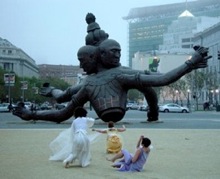
Photo by Michael Strickland
San Francisco schools and performing arts groups, hosted by the Fei Tian Academy of the Arts California, will celebrate Chinese New Year today with a two-hour-long free concert, beginning at 11:30 a.m.
The venue is the Civic Center Plaza, between City Hall and Zhang Huan's "Three Heads Six Arms" sculpture, which stands opposite the Asian Art Museum.
Alas, the monumental sculpture is leaving, on its way to other cities. It's been scaring the pigeons and giving a buzz to tourists since last May. It turns out the controversial sculptor is involved with opera, having directed Handel's Semele in Brussels.
The dance performance is produced by Cecilia Xiong and Carlos Carvajal. The show will feature various ethnic performing-arts groups and students from several private and public middle and high schools.
S.F. Opera Deficit: Unfortunate, But Limited
Long predicted by San Francisco Opera General Director David Gockley, the company is being caught up in the ongoing recession. Although the operating budget was trimmed by $6 million, fiscal year 2010 ended up with a deficit of $1.5 million.
The Opera's budget for 2009/2010 was $65.2 million, operating revenue dropped to $27.1 million, and ticket sales brought in $3.5 million less than in the year before.
Opera Association President George Hume says there is more to the problem than the crisis in the economy:
Although the recession exacerbated the Opera's difficulties in 2009-2010, it did not cause them. The company faces serious long-term challenges to its business model, including a huge obligation to fixed costs that must be addressed.David and his team have a plan in motion to address these challenges that has the board's full support. We are extremely grateful to our donors for their generous contributions to the Opera during the past season, and ask for their ongoing support as we seek answers to the toughest questions we will face over the next few years about the Opera's future.
Gockley added:
The audited deficit would actually have been $4 to $5 million more had we not prevailed upon donors to re-purpose pledges made to the Opera¹s endowment and to future season¹s productions. This is an opera company seriously out of balance, a situation which must be quickly addressed from all possible angles.
A Thoroughly Modern SFCMP Director
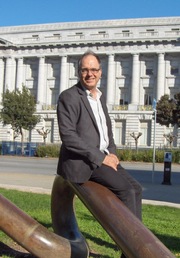
Entering its 41st season, San Francisco Contemporary Music Players will be led by newly appointed Artistic Director Steven Schick. He is succeeding David Milnes, who remains music director of the UC Berkeley Symphony Orchestra and conductor of the Berkeley Contemporary Chamber Players.
A conductor, performer, and teacher, Schick has championed contemporary percussion music for over 30 years, commissioning and premiering more than a hundred works by such composers as Brian Ferneyhough, David Lang, and Iannis Xenakis.
Since their first concert in 1971, Contemporary Music Players has performed more than a thousand works, including no fewer than 145 world premieres and 74 U.S. premieres. The ensemble commissioned 74 new pieces from such composers as John Adams, Mario Davidovsky, Philippe Leroux, Liza Lim, and Julia Wolfe. Schick says:
This is one of this country's most venerable and important ensembles for contemporary music; and the terrific musicians of the group and their commitment to cutting-edge musical ideas means that it is also an ensemble of the future. What a thrill it is for me to now be part of an organization that is both roots and rhizomes. We know where we're from; where and how we'll grow next is the exciting part.To save readers the trouble, I looked up rhizomes — it's "A horizontal plant stem with shoots above and roots below serving as a reproductive structure."
As artistic director, Schick will serve as both conductor and chief artistic administrator, providing artistic vision and leadership for the ensemble. The 2011/2012 season will feature his programming for a subscription series in Herbst Theatre, beginning in October.
Meanwhile, being in great demand as a performer, Schick is making a number of appearances in New York this month, performing John Luther Adams' Inuksuit and Louis Andriessen's Worker's Union as part of the eighth blackbird-curated Tune-In Festival at the Armory and also as conductor and percussionist in the International Contemporary Ensemble's Alice Tully Hall performances.
Back home next month, Schick appears in Schick Machine, an evening-length solo musical theater work created especially for him by the Paul Dresher Ensemble in Theater Artaud.
Schick’s percussion ensemble, called red fish blue fish, will be featured in the new Peter Sellars production of George Crumb's Winds of Destiny in June at the Ojai Festival and at Ojai North! presented by Cal Performances in Berkeley.
Skol! to Those Craving Unusual Programming
It's not every day that San Francisco Symphony offers a program of mostly unfamiliar music, but with the return of Michael Tilson Thomas from the Miami celebrations of his New World Orchestra, SFS will have a doozy.
Featuring Hindemith's Concert Music for String Orchestra and Brass, and the great mezzo Anne Sofie von Otter in songs by Stenhammar (!), Grieg, Nielsen, and Sibelius, the only concession to the familiar will be Brahms' Serenade No. 1.
The subscription concerts will be held in Davies Symphony Hall, March 3-6. Do not miss.
Nixon in China All Around Us
"Chairman [Mao] Dances," Richard M. Nixon arrives in Beijing aboard Air Force One (dwarfing memory of the onstage helicopter in Miss Saigon), and there is "The Red Detachment of Women" ballet (to Mark Morris' choreography), plus many other historical-theatrical wonders.
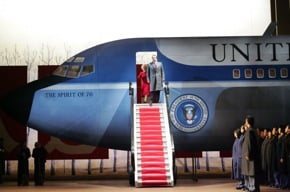
Photo by Ken Howard
This is John Adams' 1987 opera, a fascinating, groundbreaking work. It is taking a quarter century to be seen in San Francisco where it was born.
Nixon in China will be heard and seen here live Saturday morning, both in radio broadcast and HD telecast from the Metropolitan Opera, which is now producing the work for the first time. The broadcast is scheduled on the new KDFC, 90.3 FM.
The production is shown live in high-definition telecasts in two dozen movie theaters in Northern California, beginning at 10 a.m. local time. Hundreds of radio stations and HD theaters around the world participate in the event.
The Berkeley composer's opera was first seen at a workshop performance in Herbst Theatre long before a public production. Its San Francisco Opera premiere is scheduled only for June 8 through July 3, 2012.
Nixon’s world premiere took place in Houston, when the opera company there was under the direction of current San Francisco Opera General Director David Gockley.
The Met premiere is conducted by Adams himself, who points out that Nixon and all his other operas — such as The Death of Klinghoffer and Doctor Atomic — "have dealt on deep psychological levels with our American mythology. The 1972 meeting of Nixon and Mao is a mythological moment in world history, particularly American history."
Longtime Adams collaborator Peter Sellars makes his Met debut with Nixon, which he has directed in numerous production.
Baritone James Maddalena stars in the title role, which he created at the world premiere, and has sung many times since. Other key characters are Pat Nixon (Janis Kelly), Chairman Mao (Robert Brubaker) and his wife Chiang Ch'ing (Kathleen Kim), Henry Kissinger (Richard Paul Fink), and Premier Chou En-lai (Russell Braun). The Chinese names are spelled the pre-"Beijing" way in Alice Goodman's libretto.
Early reviews of this unusual opera about recent historical events, and with minimalist music, were sharply divided. Donal Henahan in The New York Times wrote that "Mr. Adams does for the arpeggio what McDonald's did for the hamburger," but in England, it was called "the most influential opera of the past 20 years," pioneering the genre of "CNN opera."
Encore telecasts will be given March 2, beginning at 6:30 p.m. Running time is about four hours.
L.A. Philharmonic HD Concerts in Theaters
The same theaters that carry the Met HD simulcasts also offer Los Angeles Philharmonic concerts. The next event, on March 13, will be [Gustavo] Dudamel Conducts Tchaikovsky. The concert begins at a more audience-friendly 2 p.m. than the Met's 10 a.m. simulcasts — and the price is $20, instead of $24 for the opera.
This all-Tchaikovsky program features his three Overture-Fantasies inspired by Shakespeare's Romeo and Juliet, Hamlet, and The Tempest. Interspersed between the music, actors will read excerpts from those plays.
Sing Out Mr. President
San Francisco's Jake Heggie is among composers asked to create short songs inspired by presidential quotes for National Public Radio Music of new songs relating to our presidents. Samuel Adler, Nora Kroll-Rosenbaum, and Nico Muhly are some of the other participating composers.
NPR notes that Thomas Jefferson was a fiddler, Harry Truman played piano, and Bill Clinton works the saxophone, but the new project, headed by Judith Clurman, "makes them sing." Clurman commissioned composers to write short choral pieces based on the words of 16 American presidents, for a series called Mr. President, in celebration of Presidents' Day.
Among the songs: "The ballot is stronger than the bullet" (Abraham Lincoln), "A leader has to lead, or otherwise he has no business in politics" (Harry Truman), "Above all, we must realize that no arsenal, or no weapon in the arsenals of the world, is so formidable as the will and moral courage of free men and women" (Ronald Reagan), and "With hope and virtue, let us brave once more the icy currents, and endure what storms may come... Yes, we can" (Barack Obama).
The songs, performed by Clurman's Essential Voices USA choir, will be released on the Deceptive Cadence blog throughout the month.

